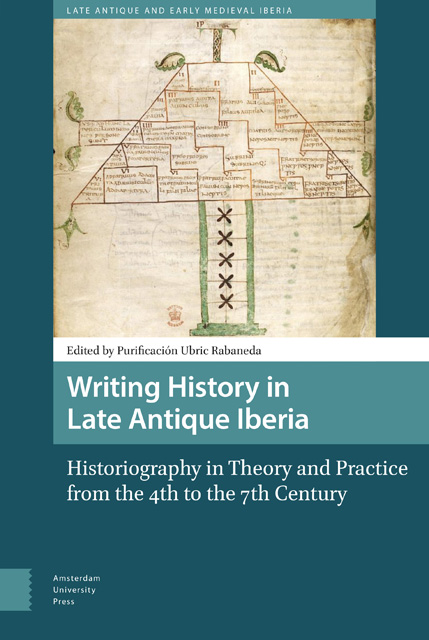 Writing History in Late Antique Iberia
Writing History in Late Antique Iberia Published online by Cambridge University Press: 18 April 2023
Abstract
Isidore of Seville is an exceptional witness to analyse the purpose of historia production in late Antiquity. The analysis of uses of the term historia by the Bishop of Seville, which he mentions more than one hundred times in his works, leads us to distinguish three different aspects. The first one is that of the definition of historia about the past as a literary genre based on classical standards. The second one is an exegetical reflection on the plural readings of the historia of a biblical text. The third one concerns the specific usages that Isidore makes from the data provided by historia , whether it is sacred or profane, in order to produce texts aiming to describe the etymologies of words or the human past.
Keywords: Isidore of Seville, historiography, Late Antiquity
Isidore of Seville is an exceptional witness with respect to analysing the purpose of historia production in late Antiquity. He wrote a Chronicon and stories of the Germanic peoples settled in Spain. In his Etymologies , he defined the various genres of writing historia about the past in service of his cultural project. Finally, there are many references to historia in the De ecclesiasticis officiis , the Liber differentiarum , the De natura rerum , the De fide catholica contra Iudaeos , and the Sententiae .
We can distinguish three different aspects from the Bishop of Seville’s works, which mention uses of the term historia more than one hundred times. The first aspect is the definition of historia as a literary genre based on classical standards. The second is an exegetical reflection on the plural readings of the historia of a biblical text. The third aspect concerns the specific usages that Isidore discerns from the data provided by historia , whether sacred or profane, in order to produce texts aimed at describing the etymologies of words or the human past.
Explicit definitions of historia as a literary genre
Definitions of historia as a literary genre are mainly found in the Etymologies , in particular in chapters 41 (De historia ) and 44 (De generibus historiae ) of book I. They include various classical data that coexist but that are not always harmonised.
To save this book to your Kindle, first ensure [email protected] is added to your Approved Personal Document E-mail List under your Personal Document Settings on the Manage Your Content and Devices page of your Amazon account. Then enter the ‘name’ part of your Kindle email address below. Find out more about saving to your Kindle.
Note you can select to save to either the @free.kindle.com or @kindle.com variations. ‘@free.kindle.com’ emails are free but can only be saved to your device when it is connected to wi-fi. ‘@kindle.com’ emails can be delivered even when you are not connected to wi-fi, but note that service fees apply.
Find out more about the Kindle Personal Document Service.
To save content items to your account, please confirm that you agree to abide by our usage policies. If this is the first time you use this feature, you will be asked to authorise Cambridge Core to connect with your account. Find out more about saving content to Dropbox.
To save content items to your account, please confirm that you agree to abide by our usage policies. If this is the first time you use this feature, you will be asked to authorise Cambridge Core to connect with your account. Find out more about saving content to Google Drive.